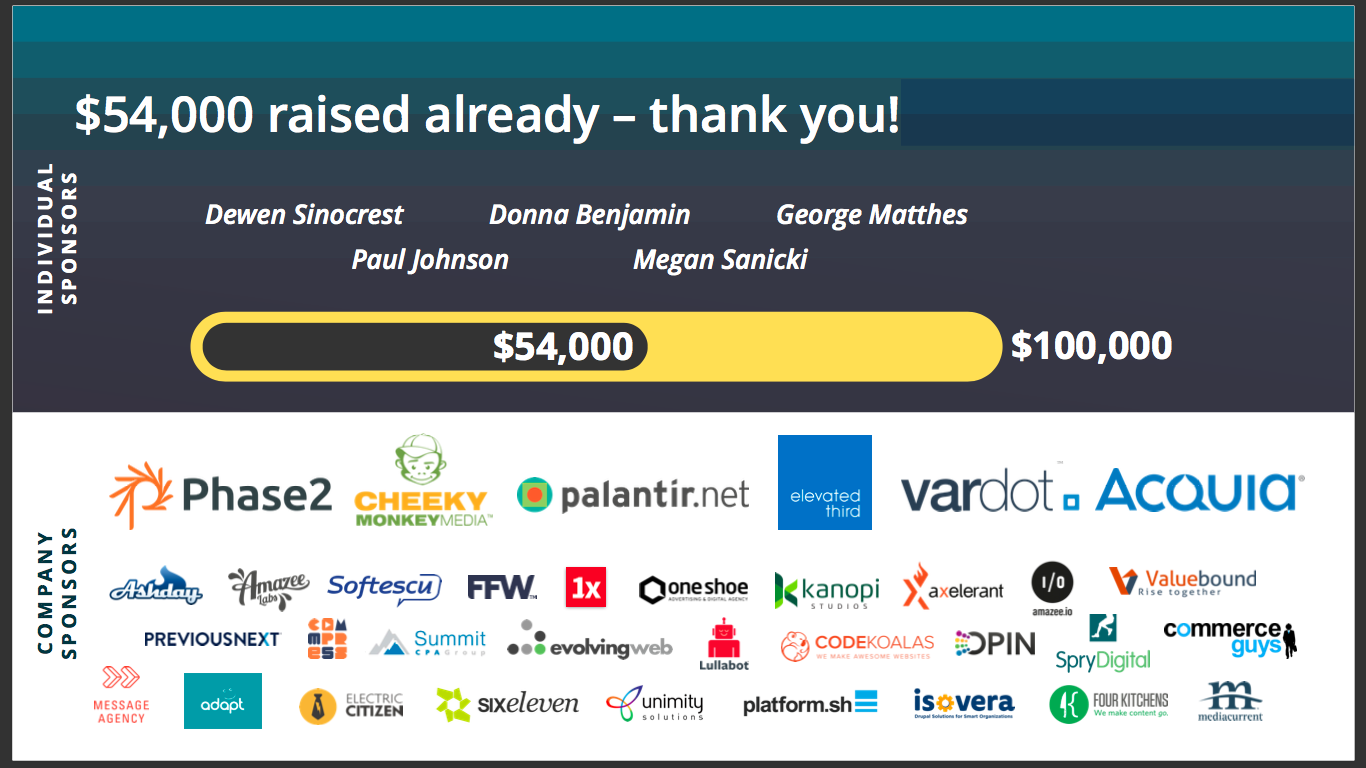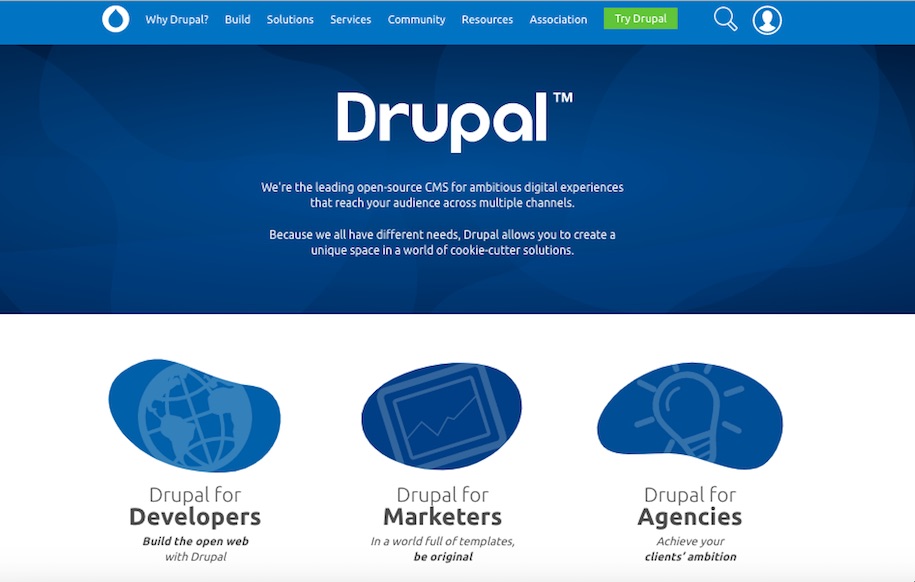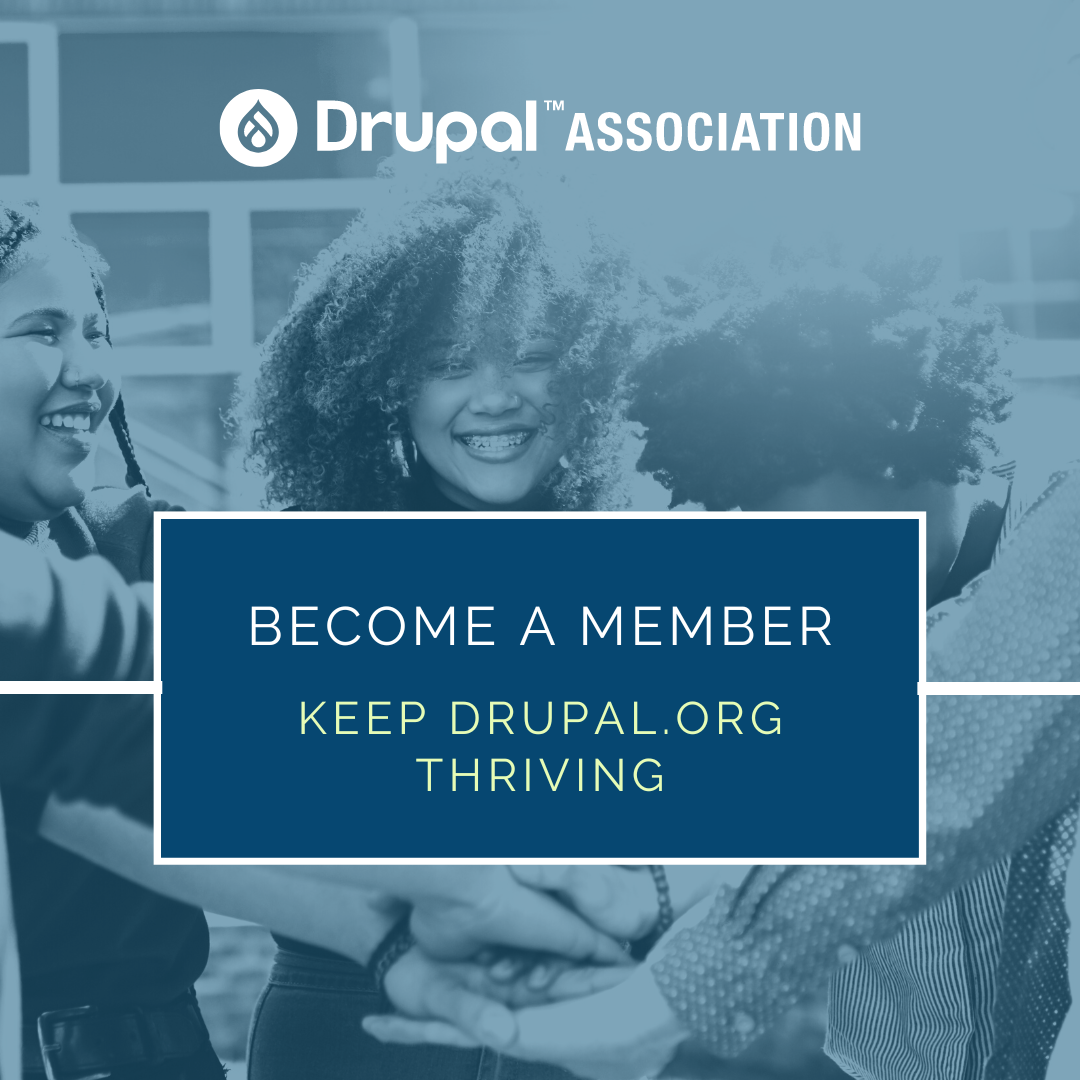 Support for Drupal 7 is ending on 5 January 2025—it’s time to migrate to Drupal 10! Learn about the many benefits of Drupal 10 and find migration tools in our resource center.
Support for Drupal 7 is ending on 5 January 2025—it’s time to migrate to Drupal 10! Learn about the many benefits of Drupal 10 and find migration tools in our resource center.You may have noticed that the Drupal.org front page has a new look. It’s just the start of our Promote Drupal Initiative that focuses on getting new decision makers to fall in love with Drupal. We started this work with the front page redesign, which is detailed below.
We will accelerate this initiative and do so much more once we reach the $100,000 goal of the Promote Drupal Fund. This allows us to put the staff and resources in place to coordinate a multi-prong Drupal promotion with community members.
Good news! We are more than halfway to our $100,000 goal. Thank you early supporters for investing in this fund.
Together, let's show the world just how amazing Drupal is for organizations.
Invest in the Promote Drupal Fund today!
About the New Drupal.org Front Page
Come for the software; stay for the community is Drupal community’s long time tagline and remains at the heart of the project. It resonates because so many of us chose Drupal as our CMS and then we fell in love with the community. We want more people to take this journey and it starts with getting more people to adopt Drupal.
That is why the Drupal Association updated the Drupal.org front page. Today, it is oriented to serve the various types of decision makers and influencers who are considering Drupal for their organization – and who will hopefully be our new community members. You may have heard about this project in our public board updates, Supporting Partner updates, or other channels. If not, this post should provide ample insight.
The research
Over the last two years, the Drupal Association iterated to improve the front page to better communicate with the audience who comes to the front page – evaluators. We could tell they were evaluators because they click on the content that someone needs to evaluate Drupal: Case studies, Try Drupal, etc. While there are roughly 2 million unique visitors to Drupal.org each month, about 350,000 of those uniques are visiting the front page.
With 93% of Drupal.org traffic being anonymous, what we didn’t know was “who were these evaluators and what did they need to fall in love with Drupal faster?”
Over the last six months we set out to answer those questions in order to inform a front page redesign. Research included:
- Cross reference traffic with audience insight tools to know who is coming to the site (using our own implementation of Do-Not-Track to ensure user privacy is respected)
- Industry research to understand who the CMS buyers and influencers are now
- Interviews with agency owners to understand who they sell to (job function)
- Persona research, especially front page user research about the key personas coming to evaluate Drupal
Identifying our evaluators
What we found was that the majority of Drupal.org front page visitors have technical positions (developer to C-level) and they work for end users (like corporations, governments, universities, etc.) or agencies. These were not surprising findings.
What was notable was that a significant amount of visitors worked in marketing and communications. This persona is the marketer and they are the people who use a CMS to generate leads for their business, gain engagement around their company’s brand and content, and drive online sales conversions.
The lead marketer is the Chief Marketing Officer and they are a new business decision maker for CMS. Many agencies are now selling to the CMO in addition to the CIO. When looking at industry reports, this isn’t surprising. Gartner and other industry reports show that the CMO spends nearly the same amount on technology as the CIO. It’s more and more the CMO or marketing technologist who determines what MarTech tools their team uses to drive their business. This includes their CMS, personalization, analytics, social, and more.
Based on this initial research, we knew the Drupal.org front page had to serve three evaluator personas: developer, agency, and marketer. The next question to answer was: “How do we design the evaluator experiences for these different audiences”? This started our persona and user research.
Understanding our evaluators
We used the research listed above to understand what these evaluators think, feel, and need when choosing Drupal. Below is a summary of our findings and how they informed the evaluator experience we created for the three personas. Note, there are many evaluation paths. Below provides a simple and consolidated view.

End user technical decision maker and influencers
The technical decision maker is the CIO or Director of Engineering for an end user organization (e.g. corporation, government, university, etc.). They ultimately decide if the organization is going to standardize on a platform. Our interviews showed that they care about performance, security, maintenance, etc. A common theme showed they have a criteria scorecard. With or without a committee they shortlist CMSes. Then, they send their developers to get information and bring it back. These developers are influencers – very important people for us to cater to.
If open source was one of the CMS criteria, then Drupal is often short listed. The developer goes to the Drupal.org front page to get information that the CIO requested such as case studies (to find out if their peers or companies of similar size use Drupal), analyst reports, and comparison sheets (e.g. Drupal vs Sitecore). Plus, this developer wants to Try Drupal so they can see how it works and decide if it is a tool they want to work with. From this point, there are many other steps like finding an agency in the Drupal.org marketplace to work with.
The user research showed that the front page needs to amplify more recognizable brand name case studies and give more detail about the power of Drupal by industry. The research as well as Matthew Grasmick’s blog shows that we need a better Try Drupal experience. Plus, we need to provide a comparison sheet that that speaks to a technical person.
While there was a need for Drupal to show up in analyst reports, there is also the understanding that Gartner and Forrester will only include software that generates income (via proprietary software license fee). Drupal being open source is not considered by these analysts (yet). So – no analyst report for now.
Marketing decision maker and influencer
To understand this persona, we talked to CMOs and marketing technologists – the marketing people who select and maintain their marketing tools. What we found is that they want to hear how a CMS can help them achieve their business goals around lead generation, brand proliferation, customer engagement, and sales conversions. They want their team to have tools that are easy to use so they can make a fast impact doing things like pushing out press releases or new marketing campaigns. Plus, they want their teams to have autonomy so they can make the changes they need all on their own and without IT. The marketing decision makers’ needs are very different from the technical decision maker.
The CMO or marketing technologist’s decision making process starts with the need to drive business and have the right tools to do this. Often they bring in a marketing consultant to provide a brand or business strategy. As part of the strategy implementation recommendation, the consultant may recommend a new CMS or other MarTech tool.
In the absence of bringing in a business consultant, the CMO / marketing technologist will do their own research, coming up with a scorecard focused on the marketing team’s needs (content authoring experience, ease of use, impact, business ROI). They will read technologist blogs that provide product comparisons. Then, they go to the product websites to get product comparison sheets that have a marketing/business focus, watch videos known as sizzle reels and they watch videos that show what it is like to use the tool from the marketing team’s perspective. They also want to see case studies, but they want to read about the product’s business impact. They do not want to read about which modules were used. Plus, they want to learn about how a product is used in their industry. After their interest is peaked, they want to talk to someone who can answer their questions and give them a demo.
The CMO or marketing technologist also gets recommendations from their influencers; individuals on the marketing team. They ask if anyone used the tool and if they liked using it and want to use it again. These individuals on the marketing team have a lot of power in deciding if a tool is selected or if a tool remains in their department. If they can’t use the tool well to make the business impact they must make, then they will replace that product.
As you can see, these two decision makers within an end user organization have different evaluation paths and are choosing software based on different criteria. This means we need to offer them unique paths with different value propositions and resources that resonate with each one.
Agency evaluator
We love when an agency choses Drupal. They provide an adoption multiplier by getting more clients to use Drupal. Plus, they are the ones who decide to have a contribution culture and encourage their staff to contribute back.
It is often the organization’s tech lead who decides which CMS to use for their clients. That title can range from the CEO to the solution architect. This persona has similar evaluator needs as the technical end user. What is different is that they also keep in mind what their clients are asking for in terms of technology choices and functionality.
General Drupal.org user research
Whichever persona we interviewed, there were some common themes that came up. They are:
- There are way too many calls to action. “I don’t know what you want me to do first.”
- The page is trying to serve too many types of people. “It’s not clear what is the page’s goal.”
- The language on the page makes me feel like this site is not for me
- When I click on things I don’t get what I expect to get
- The main navigation is confusing
- The page feels very 1990s and needs to be modernized and have a personality (not corporate, please)
Turning feedback into a redesign
After all that research and feedback, it was clear that the time was now for redesigning the Drupal.org front page.
With all this research, we decided to
- Modernize the look and feel, which was done by the amazing sixeleven who donated their services.
- Streamline the front page to reduce the calls to action
- Add evaluation paths for developers, marketers, and agencies that take them to landing pages that are tailored for their evaluation needs.
- Highlight more big name case studies
- Expand the industries pages
- Use community marketing assets like the Acquia video to provide a better evaluation experience for marketing personas.
- Update the main navigation so it is user-centric for those evaluating Drupal, Building with Drupal, and participating in the community.
What this redesign doesn’t do
We knew that we alone could not create all of the resources that are needed to effectively support each evaluation path. While we did use resources from the business community, there are many gaps such as videos that show the content authoring experience.
Promote Drupal Fund
We will complete this work via the Promote Drupal Initiative. We can begin once we reach our $100,000 goal for the Promote Drupal Fund. Funding will allow us to put the staff and resources in place to coordinate a multi-prong Drupal promotion. Contribute today!
What About The Sponsored Content
Yes, Drupal.org is funded by placing relevant and contextual content in the evaluation path. Try Drupal is a great example. We also highlight great case studies from our Premium and Signature Supporting Partners. Evaluators can still find our community case studies and we will amplify strong ones on the front page, too. We started this approach in 2014 and will continue to find ways to highlight the power of the community’s work while also finding ways to generate income through sponsored content so we can grow our Promote Drupal investments.
What about the Community Resources?
Come for the software; Stay for the community – as we improve the evaluation path, we need to make it easy for these new users to find their way to the community – to understand the power and passion of our community as well as join us in our efforts. Our Community Liaison, Rachel Lawson, will begin to work with a community group this year to improve drupal.org/community<https://www.drupal.org/community>. Much of the improvements will be guided by the feedback from the community governance group and their very useful discussions and insightful recommendations.















Comments
I'm glad to see that
I'm glad to see that marketers are being targeted by this initiative. I've had a lot of problems with marketers insisting that projects be built on Worpdress and it's difficult to talk them out of it.
I hope this initiative will focus on the lower end of the market as well as the higher end.
Woolwich Web Works: Custom web development